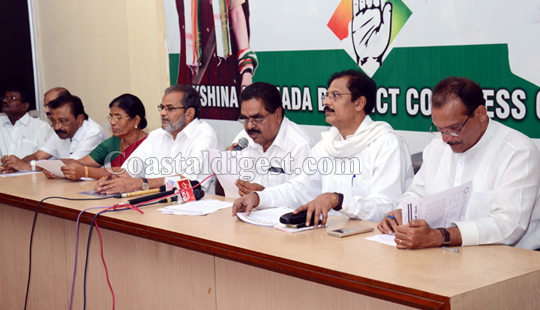Mangaluru, Feb 6: Billavas and Muslims dominated the list of 36 candidates finalized by the Congress party for the upcoming Dakshina Kannada Zilla Panchayat elections. For the first time Dakshina Kannada District Congress Committee has announced candidates for all the constituencies at one go, according to district-in-charge minister B Ramanath Rai.
Accompanied by Karnataka Pradesh Congress Committee observer and former Legislative Council chairman V.R. Sudarshan at district Congress office Mr Rai, said that the list of candidates was prepared as per the guidelines by the KPCC, ensuring social justice.
Among 36 candidates 9 are Billavas and 6 are Muslims. They are followed by Christians, Bunts and Gowdas (4 each), Scheduled Castes (3), Scheduled Tribes (2) and Jain, Rajapur Saraswat Brahmin, Ganiga and Gatti (1 each).
Only four of the 11 outgoing Congress members in the Dakshina Kannada Zilla Panchayat featured in the list—M.S. Mohammed, Mamata Gatti (former ZP president), Saraswati Kamath and Chandra Prakash Shetty. Anita Hemanath Shetty, wife of former Puttur Block Congress president Kavu Hemanath Shetty, also features in the list. She is contesting from the Nettanige-Mudnur constituency.
The full list of the candidates is as follows:
1. Kinnigoli: Pramod Kumar
2. Puttige: Chandrahas Sanil
3. Shirthadi: Sumithra
4. Kateel: Shaila Sequeira
5. Bajpe: Maimuna Nisar
6. Edapadavu: Krishna Ameen
7. Gurpuru: U P Ibrahim
8. Neermarga: Seema D'Souza
9. Konaje: Rasheeda Banu
10. Someshwar: Lakshmi Poojary
11. Sangabettu: Mailappa Salian
12. Sarapady: Padmashekhar Jain
13. Pudu: Ummar Farooq
14. Gothamajalu: Bharathi R Poojary
15. Mani: Manjula Madhava Bave
16. Kolnadu: M S Mohammed
17. Kurnadu: Mamatha Gatti
18. Sajipamunnur: Chandraprakash Shetty
19. Punacha: Chethana
20. Naravi: P Dharanendra Kumar
21. Aladangady: Shekhar Kukkedi
22. Laila: Shobha N Gowda
23. Ujire: Namitha
24. Dharmastala: B Ramesh
25. Kaniyoor: Shahul Hameed
26. Kuvettu: Shral Jeene Noronha
27. Uppinangady: Anitha Keshav Gowda
28. Nelyadi: Sarvotham Gowda
29. Kadaba: PP Varghese
30. Belandoor: Sathish Kedanji
31. Panaje: Pavithra B
32. Nettanige Mudnoor: Anitha Hemanatha Shetty
33. Bellare: Rajeevi Rai
34. Guttigar: Vimala Rangaiah
35. Jalsoor: Saraswathi Kamath
36. Aranthodu: Madhava Gowda






Comments
Muslim population in Dakshina Kannada is 24.02% according to 2011 census. Since independence, all these years, more than 70% Muslims had been voting Congress party. So, this 6 seats (16.66%) is not the due share of this oppressed Community.
Now, it's not the time to beg your share with other political parties who exploited you intentionally all these years. Muslims need to find alternative and show their power. It's time to stand firm on your feet. Unless and until you show your power in the election, nobody is going to count you!
Billavas got more seats than Muslims not because of their more number, it's because of their negotiating power. According to political parties, the market value of a Muslim vote is less than a Billava vote. There is no point in blaming congress party for this reason. It's the Muslim community who lack self confidence in taking right decision at the right time.
BJP will defeat congress for sure.
All Billava Candidates all the best.
Well done Cong. All the best. #WithCongress
Add new comment